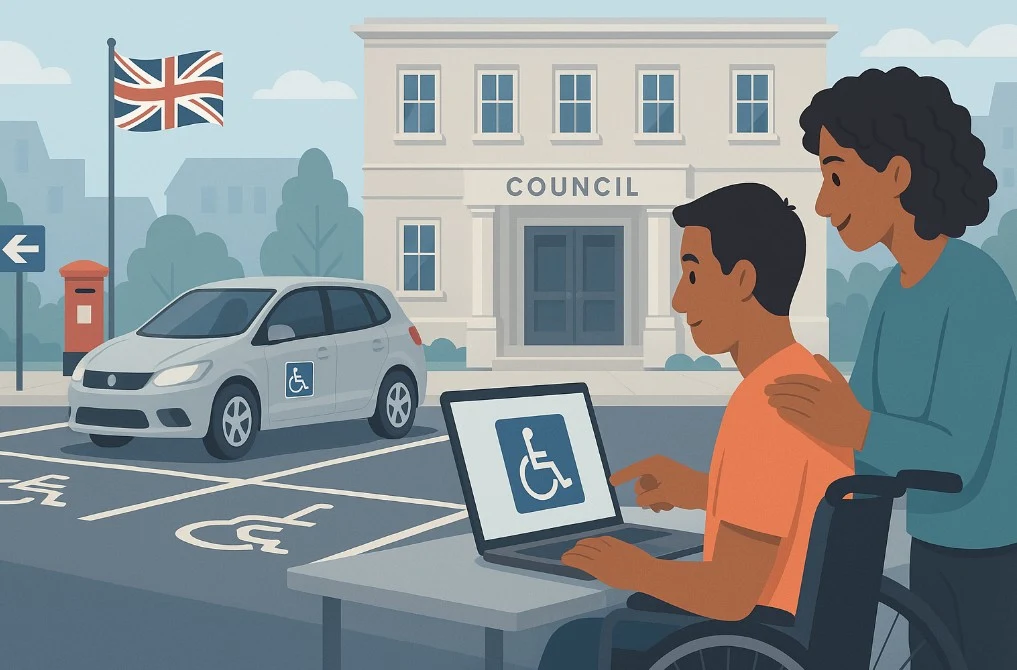Table of Contents
The Blue Badge scheme in the UK offers parking benefits for people with severe mobility issues, helping them to access essential services and locations more easily.
If you or someone you care for struggles with walking or other physical limitations, a Blue Badge could make everyday travel less stressful. Knowing how to apply for a Blue Badge ensures you submit the correct documents, understand eligibility, and avoid delays.
This guide will walk you through each step of the process, from eligibility to renewal, in a simple, professional, and informative way.
What Is a Blue Badge and Who Can Use It?
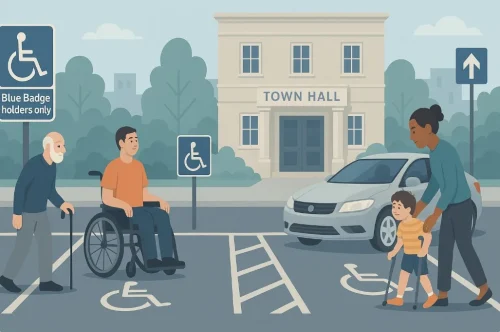
A Blue Badge allows people with significant mobility issues to park closer to their destination, making daily life more accessible. It’s not just for drivers non-drivers and carers can also apply if they transport someone with a disability.
Blue Badges are designed for:
- People with physical disabilities
- Individuals with mental health conditions affecting mobility
- Parents or carers of disabled children
- Organisations transporting disabled people
Whether you’re applying for yourself or someone else, the badge can be life-changing. It helps reduce walking distance and provides better access in towns, cities, and shopping centres across the UK.
Who Automatically Qualifies for a Blue Badge in the UK?
Some applicants are automatically eligible for a Blue Badge based on the benefits they receive or their medical condition. This means the application is more straightforward and doesn’t usually require further assessments.
You automatically qualify if you:
- Are registered blind
- Receive the higher rate of the mobility component of Disability Living Allowance (DLA)
- Get War Pensioners’ Mobility Supplement
- Received a lump sum from the Armed Forces Compensation Scheme (tariffs 1 to 8) with a permanent disability
- Score 8 points or more in the ‘moving around’ section of a Personal Independence Payment (PIP) assessment
- Score 10 points in the ‘planning and following journeys’ section of a PIP assessment and are placed in category ‘E’
Carers can also apply on behalf of children with qualifying conditions, provided they meet similar criteria.
Can You Apply If You’re Not Automatically Eligible?
Yes, you can still apply for a Blue Badge even if you don’t automatically qualify. Your local council will assess your application based on the severity and long-term nature of your condition.
You may be eligible if:
- You experience long-term problems walking
- You have a condition that causes severe anxiety in public spaces
- You have a disability that affects the use of both arms
- You are a parent of a child under 3 who needs to be close to a vehicle due to a medical condition
In such cases, you must provide detailed medical evidence and personal statements explaining how your condition affects your mobility in daily life.
What Documents Do You Need to Apply for a Blue Badge?
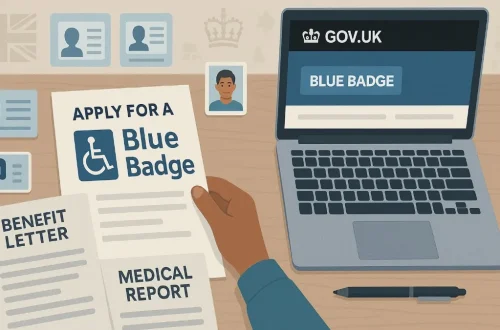
Providing the right documentation is crucial for a successful application. You’ll need to submit both identity verification and medical evidence depending on your eligibility type.
Here’s what you typically need:
- A recent digital passport-style photo
- Proof of identity (passport, birth certificate, marriage certificate)
- Proof of address (Council Tax bill, government letter from the past 12 months)
- National Insurance number or child reference number
- Proof of benefits (DLA, PIP decision letters)
- Medical evidence if not automatically eligible
For terminal illnesses:
Include Form SR1 or BASRiS, completed by your doctor or consultant. Your application may be fast-tracked in this case.
By Post:
If applying offline, submit certified copies of your documents not originals, to avoid losing them in transit.
How Do You Start the Online Application on GOV.UK?
The process of applying online is designed to be user-friendly. You’ll be directed to your local council’s application form based on your postcode.
Step-by-Step Online Application Process
Start by visiting the application portal and following these steps:
- Enter your postcode: This directs you to your local council’s system.
- Complete the form: Provide personal details, eligibility information, and medical conditions.
- Upload documents: Attach your photo, proof of identity, address, and any relevant benefit letters.
- Save progress: If you need time, you can save your application and return later.
Things to Prepare Before Starting
- Digital scans/photos of all documents
- Details of your current badge (if renewing)
- Contact information for medical professionals, if required
Once you’ve completed and submitted your application, keep a copy of your confirmation for reference and await your council’s decision.
What Happens After You Submit Your Application?
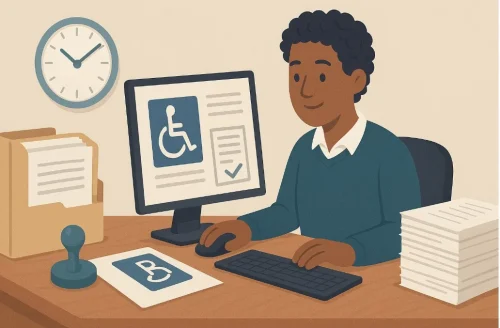
Once submitted, your application is reviewed by your local council. This process usually takes up to 12 weeks, depending on demand and completeness of the documentation.
You may be contacted for:
- A mobility assessment with a healthcare professional
- Further information or clarification
- A face-to-face or phone interview
If your application is approved, you’ll receive your Blue Badge by post. If there are delays, contact your council for updates on your application status.
How Much Does a Blue Badge Cost?
The cost of a Blue Badge varies across the UK. Councils may charge a small fee upon approval of your application.
In general:
- England: Up to £10
- Scotland: Up to £20
- Wales: Free of charge
This fee is only paid if your application is approved. Councils will inform you how to make the payment, often through an online or telephone system.
How Long Is a Blue Badge Valid?
Blue Badges are usually valid for a maximum of three years. However, this can be shorter depending on your condition or the length of benefit entitlement.
You should aim to apply for renewal before the badge expires. Using an expired badge is not permitted, and doing so could result in a fine. Always check with your local council for exact renewal timings and rules.
What If Your Application Is Refused or Needs to Be Renewed?
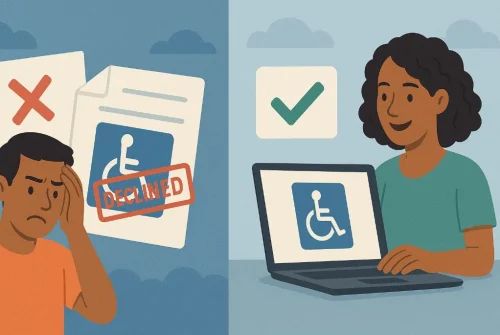
If your application is unsuccessful or your current badge is nearing expiry, you have several options to take action.
If Refused:
- Review the rejection letter for reasons
- Collect additional evidence or documents
- Request a reconsideration from your council
If Renewing:
- Apply online before your badge expires
- Update your benefit or medical condition information
- Include all updated documents
Table: Actions for Refusal and Renewal
| Situation | Recommended Action |
| Application refused | Ask for a review with supporting documents |
| Badge near expiry | Start renewal process 8 weeks before expiry |
| Benefits changed | Reapply with updated documentation |
By following these steps, you can ensure your Blue Badge application or renewal is handled smoothly and maximise the chances of a successful outcome.
Can You Appeal a Rejected Application?
Yes, you can appeal a rejected application by requesting a reconsideration from your local council. The rejection letter will include details on how to appeal and any deadlines you must follow.
In your appeal, include any additional medical evidence, personal statements, or documents that were not initially submitted.
Be as clear and thorough as possible to strengthen your case. If unsuccessful again, you can reapply if your condition worsens in the future.
How and When Should You Renew Your Badge?
Renewing your Blue Badge in time is essential to avoid losing your parking privileges. Councils recommend applying for renewal at least 8 weeks before the badge’s expiry.
When Should You Renew?
- 8 to 12 weeks before your badge expires
- Sooner if your benefits or eligibility have changed
How to Renew a Blue Badge?
- Visit the online application portal
- Select “renew an existing badge”
- Provide updated medical or benefit information
- Upload a new digital photo and recent documents
- Await council approval and pay renewal fee if applicable
Some councils also allow paper renewals, so check locally if you prefer a non-digital option.
Where Can You Get Help with Your Blue Badge Application?
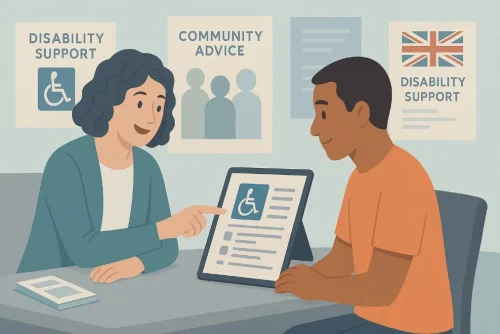
If you find the process overwhelming, there are several ways to get help with your Blue Badge application.
You can:
- Contact your local council for guidance on completing the application
- Visit local disability advice centres for in-person assistance
- Ask friends, carers, or family members to help you apply
- Reach out to support organisations that offer mobility aid resources
Some councils offer appointments or phone support to help you through difficult parts of the form.
Conclusion
Applying for a Blue Badge in the UK may seem complex, but with the right information and preparation, it becomes a manageable process. Whether you qualify automatically or need to provide extra evidence, following the correct steps ensures a smooth application.
Remember to gather the necessary documents, apply through your council or GOV.UK, and renew your badge on time. Getting help when needed can make the journey even easier.
A Blue Badge can truly enhance mobility and independence, improving day-to-day life for those who need it most.
Frequently Asked Questions
How long does it take to receive a Blue Badge after applying?
It usually takes up to 12 weeks for councils to make a decision. Delays can happen if extra assessments or documents are needed.
Can I use a Blue Badge if I’m not the driver?
Yes, you can use the badge as a passenger if you’re eligible. It must be used only when you’re travelling in the vehicle.
Is there a different application process in Scotland, Wales, or Northern Ireland?
Yes, the cost and some procedures vary across regions. Always check the specific guidance for your location.
What if I lose my Blue Badge or it gets stolen?
You must report the lost or stolen badge and request a replacement from your local council. A fee may apply for the replacement.
Can I apply for someone else’s Blue Badge on their behalf?
Yes, you can apply for a Blue Badge on behalf of someone else. You’ll need their personal and medical information to complete the application.
How do I know if my local council accepts paper applications?
Check your local council’s website or contact them directly. Some offer both paper and online application options.
Are there penalties for misusing a Blue Badge?
Yes, misuse can result in a fine of up to £1,000. Badges must only be used by or for the person they are issued to.




